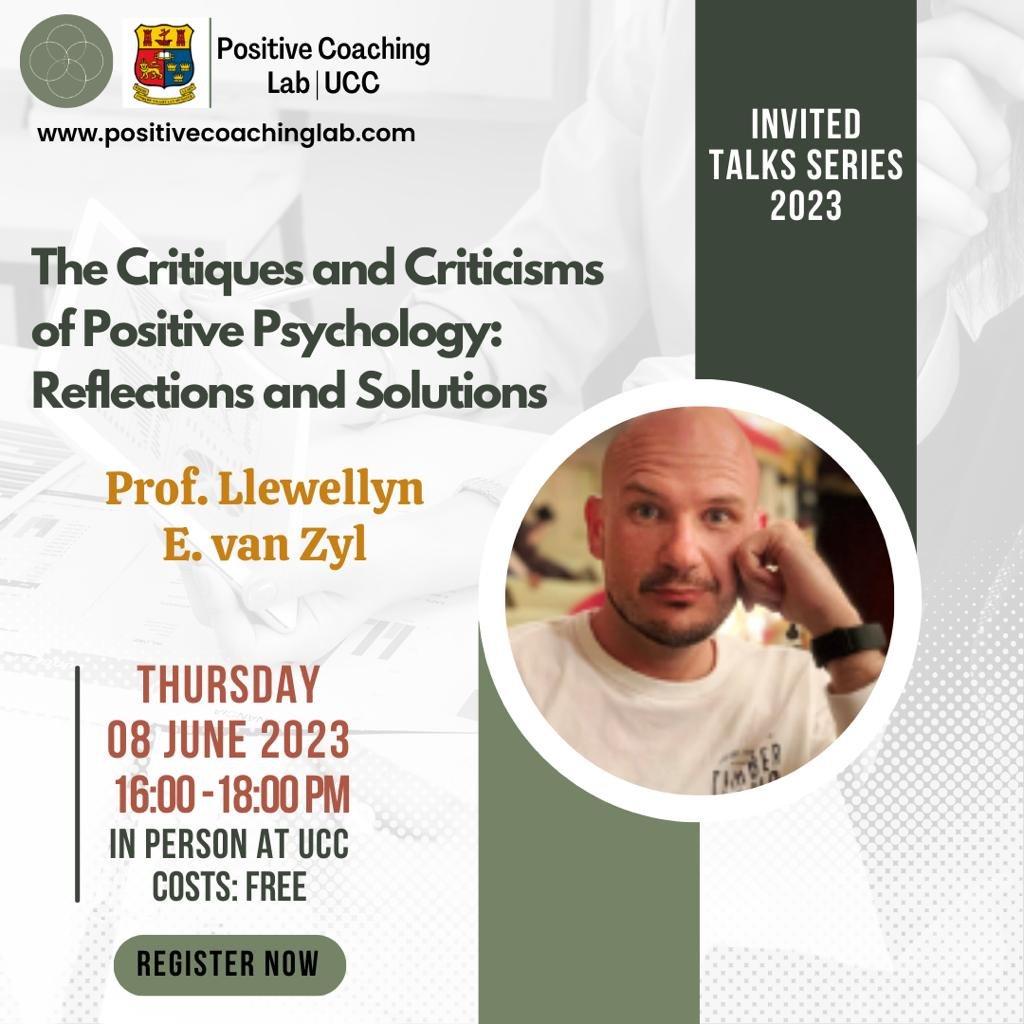The Critiques and Criticisms of Positive Psychology: Reflections and Solutions
Thursday, June 8th
16:00-18:00pm (Irish Time)
In-person Event
About This Event
Positive psychology has emerged as a thriving sub-discipline of psychology, but it has also faced criticism for its credibility as a science and relevance as a practice domain. Critics have raised questions about the discipline's contribution to understanding the human condition and the philosophies, theories, methodologies, and interventions on which it is built. A recent systematic literature review by Van Zyl et al. (2023) identified six overarching categories of critiques made up of 117 distinct criticisms. Critics argued that positive psychology (1) lacked proper theorising and conceptual thinking, (2) had issues with the measurement of positive psychological constructs and research methodologies it favours, (3) is a pseudoscience that shows poor replicability, (4) lacks novelty and self-isolates from general psychology, (5) is a decontextualised neoliberal ideology that causes harm and (6) that it is a capitalistic venture. Although some of these critiques and criticisms are not distinctive features of- nor unique to positive psychology, they have renewed interest in reflecting on the challenges facing the growth and future of the discipline.
Are you interested in understanding these critiques and criticisms of positive psychology and exploring possible solutions to these challenges? Then join our two-hour workshop to reflect on the critiques and criticisms of positive psychology critically, evaluate their validity, discuss their implications, and generate possible solutions. The workshop will introduce participants to the different waves of positive psychological research and orient them to the 117 critiques and criticisms of contemporary positive psychology. Using a world-cafe format, participants will then, in smaller groups (a) identify additional challenges facing the field, (b) debate, discuss and generate solutions to current critiques and criticisms, and (c) help chart a roadmap for advancing the science and practice of positive psychology.
The workshop aims to foster a culture of openness and collaboration, enhance scientific rigour and validity, and improve the real-world relevance of positive psychology. By the end of the workshop, participants will better understand the critiques and criticisms of positive psychology, generate possible solutions to these challenges, and contribute to a critical evaluation of the current state-of-the-art of positive psychology. Don't miss this opportunity to deepen your understanding of positive psychology and contribute to its advancement.
Intended Audience
Students, Researchers, Practitioners and Professional Coaches that are interested in the field of positive psychology and who intend to apply the principles of positive psychology in their work.
Pre-Reading
In preparation for the workshop, kindly read Van Zyl, Gaffaney, Van der Vaart, Dik and Donaldson. (2023). The critiques and criticisms of positive psychology: A systematic review. The Journal of Positive Psychology. 1-30.
Prof Llewellyn van Zyl
Llewellyn E. van Zyl (Ph.D) is a positive psychologist specialising in developing, implementing, and evaluating positive psychological interventions aimed at mental health and wellbeing. He holds a Doctorate, a Master of Commerce, an Honours and a Bachelor’s degree in applied organisational psychology and statistics, which were obtained from the North-West University (summa cum laude) at the top of his class. Professionally, he holds an extraordinary professorship in positive psychology with the Optentia Research Unit at the North-West University in South Africa and is currently attached to the Eindhoven University of Technology in the Netherlands. He also serves as the Co-Speciality Chief Editor of Frontiers in Psychology (Positive Psychology) and serves on the editorial boards of various high-impact journals. His research is mainly concerned with understanding the factors that enhance mental health and wellbeing and how such can be developed through positive psychological interventions. In practical terms, his work aims to (a) assess and model the psychological mechanisms underpinning mental health, wellbeing and performance (assessments), (b) how these states can be developed in a scientifically sound, sustainable and cost-effective manner through digital channels (intervention content) and (c) aims to understand the elements underpinning effective intervention design (online intervention methodology). Llewellyn has extensive experience within the tertiary education environment as a lecturer/researcher and within the private/public sectors as a consultant.

